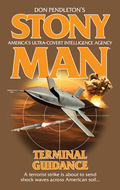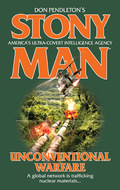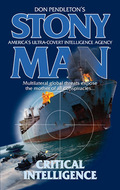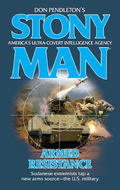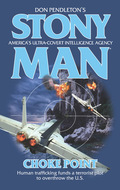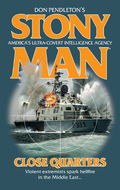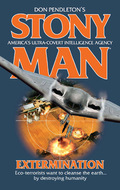Kitap dosya olarak indirilemez ancak uygulamamız üzerinden veya online olarak web sitemizden okunabilir.
Kitabı oku: «Armed Resistance»
STONY MAN
When the Oval Office needs covert rapid response to avert disaster, Stony Man gets the call. Handpicked, the best of the best in cyber-intelligence and commando warfare, this elite squad fights by a code of duty and dedication to holding the line between the free world and violent extremists.
ARMED RESISTANCE
Sudan’s political situation is a nightmare. Guerilla forces specializing in human trafficking and black market arms rule in the violence-torn region. With members undercover inside a military arms depot in Mississippi, weapons are being diverted to the rebels profiteering on human misery. Able Team moves in stateside, while Phoenix Force goes deep into the bloodiest regions of Sudan and Uganda. It’s a grim race to find a kidnapped CIA agent, a cache of human cargo and an arsenal of stolen weapons bound for illegal sale. Stony Man is hunting predators who kill for profit and pleasure—battling long odds to bring some justice to a ruthless land.
“There’s trouble!”
Manning’s eyes flicked to the rearview mirror.
James turned to glance through the back window and spotted the dim points of headlights. A jeep appeared to be closing on them fast. It could only mean police. In other countries they might have stopped, but this time they had to consider the Sudanese police on the opposite side of the fence. A good number of those in uniform were little more than thugs, and out here the Phoenix Force warriors couldn’t consider them soldiers on the same side. They would avoid a conflict if at all possible but not at the risk of failing in their mission. Lester Bukatem and his LRA guerillas were a threat that had to be dealt with, and neither Manning nor James would let police officials detain them, friendly or otherwise. Chances were good this meeting would result in their arrest and possible confinement without cause.
“If we stop, we’re dead,” James said.
“Then I won’t stop.”
Armed Resistance
Stony Man
Don Pendleton

Special thanks and acknowledgment to Jon Guenther for his contribution to this work.
Contents
CHAPTER ONE
CHAPTER TWO
CHAPTER THREE
CHAPTER FOUR
CHAPTER FIVE
CHAPTER SIX
CHAPTER SEVEN
CHAPTER EIGHT
CHAPTER NINE
CHAPTER TEN
CHAPTER ELEVEN
CHAPTER TWELVE
CHAPTER THIRTEEN
CHAPTER FOURTEEN
CHAPTER FIFTEEN
CHAPTER SIXTEEN
CHAPTER SEVENTEEN
CHAPTER EIGHTEEN
CHAPTER NINETEEN
CHAPTER TWENTY
CHAPTER TWENTY-ONE
CHAPTER TWENTY-TWO
CHAPTER TWENTY-THREE
CHAPTER TWENTY-FOUR
CHAPTER TWENTY-FIVE
EPILOGUE
CHAPTER ONE
South Sudan
Two hundred miles north of the border with Uganda a biting wind swept across the desert, wending its way through the rock formations and echoing like howling spirits.
No matter how much time Samir Taha spent in this environment he never really became accustomed to it. Even after six years spent fighting in the barren and rugged terrain of his homeland, the legends still gnawed at his spirit. For Taha and his men, the wind carried the souls of those who had gone before and fought for liberty and freedom for those in South Sudan.
“You hear them again?” a voice whispered.
“I hear them often,” Taha replied, although he didn’t look at the man who spoke. He need not look his brother in the eye. Kumar knew better than anyone else the things that troubled him.
“You know I do not believe in the spirits,” Kumar said.
“I have never asked you to believe in them, merely respect those of us who do.”
“But to what ends?”
“I do not wish to discuss this here and now,” Samir said, waving his brother to silence. “Now be still.”
Satisfied there would be no further outbursts from his young and rather impetuous sibling, Samir Taha returned his attention to the camp ahead. Their intelligence had always been good in the past where it concerned those godless bastards who chose to traffic in innocent women and children. It had been difficult to gain support from government officials. Taha wished he could have recruited more men from their own ranks for this mission but General Kiir had refused to provide them. They were a ragtag bunch, to be sure, undisciplined and poorly equipped. Only half of the assault rifles they carried, Kalashnikov variants, were even capable of full auto fire.
A good number of them were semiautomatics—7.62 mm SKS-style rifles smuggled from connections in China or American-made AR-15s chambered to fire .223 cartridges. The remaining soldiers carried pistols and knives, and the ammunition situation was plain abysmal.
Taha had even begged the general to part with a couple of AK-47s but the old man wouldn’t hear of it.
“We have no reason to believe your intelligence is good,” General Kiir had told him. “If you do this then you do it voluntarily. I cannot risk it as a sanctioned mission.”
The general’s lack of support infuriated Taha but there wasn’t much he could do about it. Although many of the men among them, particularly those who reported directly to Taha, their platoon commander, agreed with Taha, the majority of them didn’t want to cross Kiir. Even among the brave fighters of the Sudan People’s Liberation Army, who were fighting for independence from North Sudan, there were those who still bartered for position by politicking. Taha had no use for such men and he knew who they were. He had flatly refused some of those who had volunteered to accompany him on his mission, knowing where their loyalties truly lay.
Up ahead, Taha saw the cook fires of his enemy and smelled the roasted meat on which they gorged themselves. Probably most of their food had been stolen from the village they had razed early the previous morning. Most of the men in the village had been slaughtered, their bodies covered with flies and some of their hands—detached by explosives or the heavy rounds of .50-caliber machine guns—mutilated as food for wild dogs and hungry cats. It hadn’t taken any imagination for Taha to conclude it was the work of the Lord’s Resistance Army.
The very name was vile and brought a sour taste to Taha’s mouth every time he thought of it. These men, barbarians whom Taha would not even acknowledge as fellow countrymen, had known their way in this region long enough. If the authorities in the cities and the members of the Sudanese Armed Forces, representing North Sudan, would not lift a finger to protect innocent Sudanese, then Taha would do whatever he could to fight for those incapable of defending themselves. It was what good men did—it was what Christian men did.
“Prepare to sound the signal,” Taha ordered his brother.
Kumar said nothing in response; they had practiced this many times and he knew what to do.
In one respect, God had been shining his blessings upon them since the wind would mask their approach. The Lord’s Resistance Army would not expect them in the least; their leaders knew of the SPLA’s desire to avoid conflict whenever possible. When the fighting grew too bad, that’s when the government got involved and sent in armed forces that were well-equipped and well-trained. But those military units were not discerning and their orders were to kill any official combatants irrespective of creed. Somehow, and Taha had never been able to understand it, many more of the men in the Sudan People’s Liberation Army had fallen victim to the genocidal policies of the Sudanese Armed Forces than those of the Lord’s Resistance Army. It was more than numbers, more than coincidence.
No matter, because Taha no longer feared what another man could do to him—he only feared looking into the eyes of his God and being condemned to eternal hell because of cowardice. He was accountable for the blood of his brothers and he did not want that accounting to be one of shame. So he would bear whatever burdens were laid upon his shoulders in this time and place.
The signal came: a sudden squelch of the radio in his ear. Taha left the cover of the rocks and moved toward the camp perimeter. Many of the sentries were weary and unprepared for the sudden ferocity of Taha’s assault. As the men entered the camp, stepping inside the defensive line of men spread across the perimeter, the peaceful solitude of the encampment erupted into chaos. One of the Lord’s Resistance Army guards looked Taha in the eye a moment before the warrior leveled his SKS assault rifle and squeezed off three shots. The 7.62 mm rounds cut an ugly pattern in the man’s belly and dumped him onto his back.
Taha turned toward his next target only to discover a very young man who could not have been more than fifteen, but the subgun clutched in his fists knew neither age nor restraint. Taha grimaced even as he fired a short burst that blew the young man’s head apart. Blood and brain matter erupted from the stump of his neck, some of it landing in a nearby cook fire, and the boy’s body followed a moment later.
Taha scooped up the submachine gun, quickly inspected it in the light of the flames now immolating his enemy’s small body and realized why its profile had looked so familiar. It was an M-16 A-3 assault rifle, carbine model with stampings from the U.S. military. The markings surprised Taha so much he nearly lost his life with the distraction. Two LRA members rushed him, the muzzles of their weapons leveled in his direction and winking with the first shots. Taha threw himself into the sand and triggered both of his weapons simultaneously. The rounds managed to stop one of the LRA terrorists in his tracks, but the second evaded by jumping to the right.
Unfortunately neither of the men was at a distance that made using his assault weapon practical and they both committed to a grappling match simultaneously. His opponent was younger and much faster, but Taha had strength and experience on his side. Even as the knife blade sang from the man’s sheath and swung in for the soft tissue of his belly—the blade glinting wickedly in the light of the fire—Taha managed to get inside the attack. Using a move shown to him once by an American mercenary, Taha twisted the arm and hand in a downward motion while stepping between his opponent’s legs. He then twisted in the opposite direction and brought the hand upward while sweeping the outer leg. The force of the sudden reverse in motion effectively dumped his enemy onto the ground, and Taha followed with him. He let his weight do the rest of the work and buried the knife blade into the man’s chest to the hilt.
Taha scrambled to his hands and knees, beads of sweat immediately forming across his head and exposed arms, perched over the twitching body of the man. Taha vomited onto him as the fear and adrenaline nearly overtook his system and caused him to pass out. Head swooning and eyes watering, Taha took several deep breaths and in spite of himself got to his feet. He stood unsteadily for a moment before realizing if he didn’t recover now he stood the chance of being overcome by additional enemies. Taha searched frantically on the ground until he located his weapons, retrieved them and moved off in search of more men to kill.
Taha made it through the camp in no time and realized that the battle had barely begun before it ended. Taha located Kumar and ordered him to give the signal the group should rally. When they were assembled and a head count was taken, Kumar advised his brother that all were accounted for and only one man was wounded.
“Only one?” Taha repeated.
“They were of no significance, this enemy force,” Kumar replied.
Another loyal fighter named Sadiq added, “These were hardly men, my friend. I have fought the dogs of Lakwena before, and these men were untested. They are almost children that were left behind to hold this camp.”
None of this made sense to Taha. He looked at Kumar. “A decoy?”
“I have never known them to do anything like this before, my brother.”
“Nor have I,” Taha said with a vigorous shake of his head. He held up the M-16 A-3 for the men to see. “I also took this off one of the Lakwena fighters. It is American-made and a forgery I seriously doubt.”
“Why would Americans equip our sworn blood enemies with weapons to fight us? They will hardly even provide General Kiir with equipment we’ve requested. Have they switched their allegiance?”
“I do not have an answer, Kumar,” Taha said. “But it is not of great importance right now. Begin searches on the remainder of the camp and see if we can find any clues as to the direction they may have gone. Also search the body of every man here. If you find any alive, see if you can revive them enough to question them. I want to know if any of the others have American weapons on them. General Kiir will want to know this and any intelligence that we can take will help us. Let us not return to our leader empty-handed.”
With a nod from Taha to signify he had finished giving orders, the men scattered across the camp and began to search the bodies for any information. Taha doubted they would find any—it wasn’t like the Lord’s Resistance Army to leave behind anything of value.
His unit had learned of the camp from a young girl, a villager who managed to escape notice and waited in the weeds for three days straight, afraid to show herself even after she saw Taha’s force arrived at the village. Of course the little girl had been able to tell them absolutely nothing of the size of the force or the weapons they were carrying; such things were not naturally part of a young girl’s life and should never have been. Taha had been unable to imagine what that poor, motherless child had witnessed. The Lakwena dogs committed atrocities against the females while the men and boys of the village watched helplessly, tied down to stakes or herded into pens where they had their feet cut off and the wounds cauterized by hot brands so they didn’t bleed to death.
Instead they died by infection and dehydration, an unimaginable death so horrific it made Taha want to be sick again.
As Taha inspected the weapon in his hand once more he wondered if there was a grain of truth to Kumar’s accusation. Were the Americans supplying their enemies with guns? It made no sense to him. He knew a few Americans—mercenaries from a paramilitary company who had come to advise General Kiir and bring supplies and equipment. There was no benefit to Americans, military or civilian units, for the fighting to continue among the various factions in Sudan. In fact, quite the opposite since Sudan hosted resources and other valuable commodities of great interest to American companies and their foreign investors. They had always demonstrated a willingness to do what was necessary to resolve the civil strife that threatened stability in the region.
No, it did not make any sense for them to help the Lord’s Resistance Army.
There had to be another explanation. He would ask General Kiir to make contact with his friends in the United States. The general had contacts through the CIA operative working out of the capital. These men would know what to do—they would be able to provide answers to this mystery.
And perhaps they would help.
CHAPTER TWO
Stony Man Farm, Virginia
The help would come in the form of the five men who sat awaiting the arrival of Harold Brognola and Barbara Price.
Many briefings had occurred in the confines of the War Room, as well as a good many debriefings following more successful missions than any of those men cared to count. Their presence signaled the results of what just one man can do when he’s trying to make a difference. The covert unit at this table, Phoenix Force, had been born from the courage and bravery of the inimitable Mack Bolan. Bolan’s war started against the American Mafia but eventually broadened to a fight against worldwide terrorism.
Forged from the spirit and unswerving abilities of Mack “the Executioner” Bolan, the men of Phoenix Force had earned a reputation as one of the finest fighting units in the world. Not even the President of the United States and a good number of his predecessors knew their identities; that was a privilege reserved only for the select few whom this band of brothers trusted with their lives.
Leading the team of warriors was David McCarter, a fox-faced Briton who’d begun his career serving with the SAS. To his left sat Rafael Encizo, whose life had started as a prisoner in the death prisons of Fidel Castro. The lone Canadian was Gary Manning. A former explosives expert with the Royal Canadian Mounted Police, Manning had a penchant for hunting rifles and possessed uncanny knowledge of terrorist groups around the world.
The other two men of Phoenix Force were successors but no less effective in their own rights. Calvin James had been handpicked by the late leader of Phoenix Force, Yakov Katzenelenbogen. A former Navy SEAL and member of a Chicago P.D. SWAT team, James was a human force with which to be reckoned. Finally, the youngest and newest member of the group was Thomas Jefferson Hawkins. Hailing from the Lone Star State and known for his quick wit, Hawkins had served honorably with Delta Force until leaping at the opportunity to join his elite friends.
Together these men had battled and overcome the forces of evil around the globe under the guidance of the most covert special operations agency in the world: Stony Man.
The Phoenix Force warriors greeted the arrival of Brognola and Price with little fanfare. While nobody pointed out the fact the pair was fifteen minutes late for the briefing—something rather unusual for these particular individuals—there was no mistaking the air of anticipation in the room. It hung like an electrically charged cloud above the Phoenix Force warriors, and Hal Brognola, director of the Special Operations Group, immediately noticed it.
“I’m sorry we’re behind schedule but it was unavoidable,” Brognola said. “I know you’re itching for action so we’re going to keep this as short and sweet as possible.”
“As soon as you’re briefed,” Price said, “there’s a chopper waiting to take you to Andrews. Jack is there now doing the preflight so we’ll skip the ceremony.”
It seemed as if everyone simultaneously issued a sigh of relief. Not that they would have done anything other than sit patiently while Price laid it out for them in ever-arduous detail. The mission controller was cool and calm under the worst situations, often treating them in a very maternal fashion, although only because of her natural personality; she had no real desire to flutter around them like a mother hen.
“We’re sending all of the main details to your portable devices,” Price continued as she sat at the table and flipped a strand of the honey-blond hair behind her ear. “You can study those on the flight out.”
“Where are we headed, love?” McCarter asked.
“We’re sending you for several days of fun-filled adventure in Sudan,” Brognola said. “There’s a time factor involved here and I want to give you as much time as possible, hence the brevity of this particular meeting.”
“Here’s the short story,” Price said. “Four days ago, a CIA agent in Khartoum received communication from a man named Rahmad Kiir, the general and leader of the Sudan People’s Liberation Army. Contact with Kiir isn’t apparently that uncommon for the CIA, since they’re able to provide a considerable amount of information regarding activities inside the Sudanese government. Those activities are of course the real story about what’s happening and not merely the bull hooky they like to feed our embassy. To break it down succinctly, some of Kiir’s men were on a mission to rescue villagers who had been taken by members of the Lord’s Resistance Army.”
“Also known as the Lakwena,” Brognola interjected helpfully.
“I thought the LRA was practically obsolete these days,” T. J. Hawkins remarked.
“Hardly,” Manning said. “Even since al-Bashir was elected president, Sudan still hasn’t fully complied with the minimal standards for effective elimination of human trafficking. The situation has been complicated by a civil war between North and South Sudan, which the LRA has exploited.”
“That’s for sure,” Encizo added.
Price nodded. “Sudan is a source country for men, women and children trafficked internally for the purposes of forced labor and sexual exploitation. It’s also a transit and destination country for Ethiopian women who are sent abroad as domestic servants. The Lord’s Resistance Army is one of the chief entrepreneurs in this business and they harbor a good number of children from both Sudan and Uganda for forced labor, sex slavery and myriad other atrocities. Often they have integrated themselves with militia groups in Darfur and abduct young women and girls for every kind of perversion you can imagine.”
Calvin James made a show of cracking his knuckles and said, “Sounds just like the kind of group we specialize in eradicating.”
“While I’d love to tell you to go forth and conquer all, I’m afraid that there’s a significant U.S. interest in this,” Brognola said. “While some of General Kiir’s men were hitting this village, they killed a number of LRA terrorists who, as it turns out, were carrying military-grade weapons. Those weapons were stamped with markings naming them as property of the United States Army.”
“How do we know they’re real?” Manning asked.
“Oh, they’re real,” Price said. “The serial numbers have already been verified and we have positive photographic identification from our CIA contact. There’s just one problem and that’s where the President decided it was time to involve Phoenix Force. In fact, even Able Team is going to have a hand in this one.”
“I can already see I’m not going to like this,” McCarter said.
“You’re too ugly to live forever anyway,” Hawkins ribbed him.
As the men responded with laughter, Price dimmed the lights and directed their attention to the screen at one end of the War Room. The image of a young, good-looking man in a suit materialized and the room fell quiet.
“Here’s complication one,” Price said. “This is a case file photo from the dossier of one Jodi Leighton, a CIA case officer who up until two days ago was serving as General Kiir’s contact and feeding information back to his higher-ups in Washington. Now Leighton has disappeared along with the evidence recently given to him by Kiir’s men.”
“Before you ask and because I know you will, we have no idea what happened to Leighton,” Brognola said. “He’s just disappeared into thin air and his friend and contact who acts as liaison between him and Kiir has been unable to find out anything.”
“I hate to bring it up, but have we considered the possibility this chap’s gone rogue?” McCarter asked.
“It’s not an unfair question but our general feeling is that it’s not Leighton’s style,” Price said. “First of all, the guy didn’t have any reason to suddenly pack it in and split. If anything, his efforts here would have won him a commendation and possibly even a ticket out of that place. Naturally when a CIA officer comes into information of this nature it automatically puts him in a dangerous situation. The world of espionage is filled with double agents, deception and betrayal.”
“Okay, fine,” Encizo said. “But it’s also not unlike a CIA spook to simply walk away if they think their identity has been compromised. Six months later they turn up in the Bahamas wearing a Hawaiian shirt and a bad dye job.”
“That’s true, but we’re still not convinced that’s the case here,” Brognola said. “Tell them about Able Team, Barb.”
“And so complication two,” Price said. “A few hours ago we called Able Team off of vacation and sent them to Camp Shelby.”
“In Mississippi,” Hawkins said.
“That’s the place,” Brognola replied.
“As I mentioned before, we were able to trace the serial numbers of those weapons to determine their authenticity,” Price said. “But we were also able to determine the place of origin right on down to the actual armory from which they were stolen. The numbers fell on Camp Shelby and recently the chief Army officer who oversees the S1 facility there, a career supply man by the name of Colonel Jordan Scott, has no explanation.”
“Okay, I’m with you guys now,” Manning said. “This is no damn coincidence.”
“We thought you’d see it our way,” Price replied sweetly. “The fact is the appearance of these weapons in Sudan coupled with the disappearance of two high-ranking officials has the Man’s skin crawling. The President wants to see action and he wants to see it in the next twenty-four hours. Tops. We have a very short time to accomplish our mission objectives.”
“Which are?” McCarter asked.
“Your job is to meet up with Leighton’s contact in the Sudanese government,” Brognola said. “From there, he will take you to General Kiir’s team, who discovered the weapons. We’ve had a personal request from Kiir and that is to help them retrieve the some fifty women and children who were taken from this camp.”
“Begging your pardon here,” James said. “I’m not sure I understand why you’re sending us to rescue these Sudanese villagers. I mean, I have absolutely no problem doing this but it seems a departure from the normal mission objectives. We typically are asked to run away from the problems internal to countries, avoid any sort of press, as it were. Now you’re asking us to do just the opposite? Help me out here.”
“Well, first, we’ve obtained a lot of good information from General Kiir over the years and we’ve tried to support him every chance we get,” Price said. “Second, we believe that if you follow the trail of the Lord’s Resistance Army and find the people they’ve kidnapped, chances are good you will find Leighton, as well. Nothing else makes sense in lieu of the fact that these weapons were found on deceased members of the LRA.”
“Not to mention the fact that the Lord’s Resistance Army was categorized as a terrorist organization many years ago by U.S. authorities,” Brognola added. “If you can take a few of the bastards down while you’re at it, I’m sure nobody on this end of the world is going to lose much sleep.”
James nodded and with a firm tone replied, “That works for me.”
“I assume you’ll be coordinating our information with Ironman and friends?” Encizo asked, referring to Able Team’s hot-tempered leader, Carl Lyons.
“Absolutely,” Price said. “It will be the status quo and we’ll make sure any information they come upon will get into your hands ASAP.”
“And what about this Leighton bloke?” McCarter asked. “What happens if we find him dead or, dare I think about it, we don’t find him at all? I would think that will pretty much end the trail and kill any further chance of accomplishing mission objectives.”
“If you find him dead, then there’s a pretty good chance that whoever killed him will have left a trail,” Brognola said. “But even if they didn’t, the main objective is to retrieve the Sudanese hostages and get those weapons back. Failing that, see to it that they’re destroyed. If the United States Army can’t use them, we’re certainly not going to let a band of terrorists have their way with them.”
“The other thing to remember is that you won’t be able to trust a soul on this one,” Price said.
“I wouldn’t have it any other way, love,” McCarter replied.
“We have to assume that nobody can be trusted with this outside of our own teams,” Brognola said. “Even if you find Leighton alive, until we get some answers from Colonel Scott and can verify the transshipment pipeline that allowed those weapons off the base, let alone out of the country, we have to assume there’s treachery on both sides.”
“One thing that stumps me is why we weren’t alerted earlier that these weapons had gone missing from the armory at Camp Shelby,” Hawkins said. “I mean, we’re talking about a massive installation, utterly secure with the largest Army reserve unit in the free world stationed there.”
“That’s part of what Able Team is going to be looking into,” Price said. “They’ll be carrying credentials identifying them as agents with the Army’s Criminal Intelligence Division.”
“That’s a new one,” Encizo observed.
Brognola said, “Since these are military weapons that have gone missing, this would normally fall into their purview. We knew if we sent them posing as members of Homeland Security or the FBI, there was a chance they’d get stonewalled out of the gate.”
“At least from this angle the sending of Army CID agents has the dubious distinction of looking like we’re trying to keep it inside the family, so to speak,” Hawkins observed.
“A very astute observation, T.J.,” Price said.
“My mom says I’m smart,” Hawkins replied with a cheesy grin.
“Any other questions?” Price said.
“Just one,” Manning said. “We know that the situation in Sudan is tumultuous at best. You told us that we basically can’t trust anybody over there. What other opposition could we expect to encounter beside that of the Lord’s Resistance Army?”
“I wish I had better news but the question is fair all the same,” Price said with a deep sigh. “The fact is you’re right, there has been an almost constant ethnic and rebel militia going up against some other ethnic and rebel militia since the 1960s. Hundreds of thousands of refugees have been forced out of the country and into the neighboring territories of Ethiopia, Kenya and the DRC. The Sudanese government army hasn’t had the resources to combat the widespread terror and violence in the country. These groups aren’t just fighting for food and water. In some cases they’re filled with religious fervor, as well.
Ücretsiz ön izlemeyi tamamladınız.

